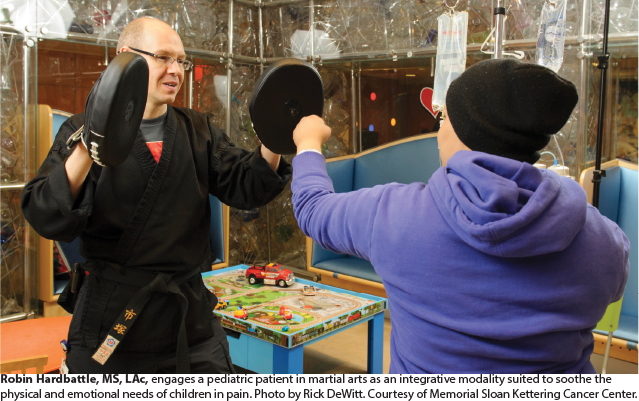The fundamental challenge in treating children with cancer centers on how to help relieve their suffering while they undergo difficult care. Typically, they do not yet have adult coping skills, and even if they had some ability to cope, many of the issues they face during treatment are overwhelming. During the span of their treatment, pediatric patients with cancer face a range of physical and emotional issues, including pain, nausea, fatigue, and physical weakness, along with the similarly common emotional challenges of anxiety, fear, and depression.
Within the unlikely field of martial arts, we have applied a tailored approach to each individual that greatly relieves these common challenges. At a brief glance, using martial arts in a hospital setting as an integrative modality may seem incompatible to the restrictions inherent in treating cancer. On closer examination and with appropriate application, however, it becomes evident that it has much to offer.
Although commonly seen as simply a way to fight, the field of martial arts is a rich, multilayered body of knowledge on dealing with physical, psychological, emotional, and spiritual adversities. With appropriate adaption to the pediatric environment and solid understanding of pediatric oncology, the martial arts are well suited to soothe the physical and emotional needs of children in pain.
The MSKCC Program
Since 2012, Memorial Sloan Kettering Cancer Center (MSKCC) has provided a martial arts program that serves all pediatric patients with cancer. Combining the mind-body practices of physical fitness, breath awareness, guided imagery, and meditation, this program introduces a range of appropriate coping mechanisms that improve mood, reduce anxiety, and alleviate pain.
Each session is tailored to the individual needs of the patients, working in small groups or individually in the Pediatric Day Hospital or at the bedside. Sessions are provided also for patients in isolation for extended periods, such as those undergoing hematopoietic stem cell transplantation. Throughout the duration of their treatment, from the first visit to the end of care, the program provides support in close collaboration with nurses, physical therapists, occupational therapists, social workers, and child life specialists.
The program aims to help patients at the time and place of their choosing and when a mind-body intervention would be most effective. This often requires accompanying patients while they undergo painful or frightening procedures. Reinforcing the exercises taught earlier while providing emotional support significantly improves the patients’ experience. Ideally, as children integrate the coping skills taught from the outset, they become more confident and self-sufficient, to the point that the therapist is no longer needed.
Benefits of Physical Exercise
With more than 200 studies demonstrating the benefits of physical fitness in patients with cancer, physical activity is increasingly acknowledged as a legitimate medical therapy.1 Data increasingly show that physical activity increases survival.2,3 Evidence also indicates that activity can decrease both physical and emotional symptoms during treatment, with improvement in muscle strength, aerobic capacity, quality of life, fatigue, and overall emotional status.4,5
Adaptability of Martial Arts Practices
Fitness activities are adapted from a variety of martial arts styles. A suitable activity can be introduced regardless of one’s physical limitations and given a willingness to participate. Specific appropriate techniques can be adapted and applied to each circumstance, whether the children are standing, sitting, or supine.
In addition to developing strength, balance, and coordination, these techniques can help to reduce anxiety and pain, improve sleep, and serve as an emotional release. The activity offers a healthy physical outlet for the children’s fear when they need it most. Such a release can help with behavioral and compliance issues, particularly in younger patients who have few established coping mechanisms in place.
These activities also empower pediatric patients, providing a sense of strength when they are physically weak and struggling with fear. That sense of physical strength can translate to a sense of determination to persevere. Within the context of martial arts, the child’s situation is reframed from that of a victim of circumstance to a fighter in the battle against disease.
By working with physical and occupational therapy, the children’s specific needs can be addressed from multiple angles that they may perceive as fun. They follow the appropriate path to rehabilitation without knowing it. Enthusiasm for these activities often inspires children to maintain physical activity throughout their treatment. This often continues following discharge and becomes a regular pursuit. The most common question parents ask at that point is “My kid wants to do martial arts at home. What do you recommend?”
The foundation of meditative practice is integral to many martial arts activities. Therefore, physical training and practice are used as a bridge to mind-body activities. Introducing simple breathing exercises in the context of learning correct punching, for example, is an ideal way to introduce the concept of mindful breathing to children.
Mind-Body Practice
There is now ample evidence indicating the value of breathing, mindfulness, and meditative practices as effective treatments for a wide range of symptoms, including pain, anxiety, depression, fatigue, and sleep disturbance.6-8
Research pertaining specifically to martial arts is more scant. The most notable studies to date address Tai Chi and Qigong, practices that include both physical and meditative components. Early results indicate clear benefits, both physical and cognitive.9-11
Breath regulation and focus, both adapted from the martial arts, are central to mind-body practices. By becoming mindful of their breathing, patients take the first step in controlling their bodies. This activates the parasympathetic nervous system and subsequently their reaction to stress. Moreover, this exercise becomes the foundation for more sophisticated visualization practices.
Guided imagery is an ideal way to introduce children to the practice of meditation. A successful guided meditation is possible with patients as young as 3 years of age. Even in the busy environment of a pediatric hospital, pediatric and adult patients can achieve a deep state of physical and emotional relaxation. Long-term patients, trapped in an environment with little privacy or comfort, often struggle with anxiety and depression. Through the practice of meditation, and especially guided imagery, children can reclaim a sense of control in an environment where they have little if any control. They can close their eyes and “go home.”
In the short term, these skills help with the immediate issues of anxiety, fear, and pain by promoting self-control, inner peace, and tranquility. In the long term, these skills become tools throughout life.
Challenges in Pediatrics
An especially difficult challenge in pediatric oncology is administration of a painful therapy or procedure to an uncooperative child. From delaying tactics to outright rebellion, children struggle to prevent it, but inevitably they must undergo the procedure. By arming children with appropriate mind-body skills, we can reframe the procedure from a traumatic experience to an unpleasant but necessary event.
An especially difficult treatment at Memorial Sloan Kettering’s Pediatric Day Hospital is the monoclonal antibody therapy for neuroblastoma. This treatment causes extreme pain for 20 to 30 minutes, and children routinely scream in pain. This is traumatic for the patient and difficult for all participants, including parents and medical staff.
In collaboration with other integrative medicine therapists and the pediatric staff, we are able to guide children through this treatment in relative comfort. Using breathing exercises, guided imagery, and music, we place them into a deep meditative state. This can profoundly relieve pain and fear and improves the overall experience, as early data corroborate.12
The most notable organization to have worked successfully in hospitals is the nonprofit “Kids Kicking Cancer.” It was with the committed martial arts instructors at this organization that we were first introduced to the potential of this modality. To our knowledge, Memorial Sloan Kettering’s martial arts program may be the first dedicated hospital program of its kind.
Closing Thoughts
As an integrative therapy, martial arts are in their infancy yet have substantial promise. They have substantial potential as a mind-body modality to help not only children with cancer but also to manage other severe medical challenges. It is our hope that, as the benefits of this discipline become increasingly well recognized, additional institutions will look toward the combination of martial arts and meditation as an important addition to patient care. For children facing pain and adversity, this modality may very well be of help. ■
Disclosure: Mr. Hardbattle reported no potential conflicts of interest.
References
1. Steindorf K, Leitzmann M, Friedenreich C: Physical activity and primary cancer prevention, in Ulrich CM, Steindorf K, Berger NA (eds): Exercise, Energy Balance, and Cancer, pp 83-106. New York, Springer, 2013.
2. Meyerhardt JA, Giovannucci EL, Holmes MD, et al: Physical activity and survival after colorectal cancer diagnosis. J Clin Oncol 24:3527-3534, 2006.
3. Meyerhardt JA, Giovannucci EL, Ogino S, et al: Physical activity and male colorectal cancer survival. Arch Intern Med 169:2102-2108, 2009.
4. Mishra SI, Scherer RW, Geigle PM, et al: Exercise interventions on health-related quality of life for cancer survivors. Cochrane Database Syst Rev 8:CD007566, 2012.
5. Cramer H, Lange S, Klose P, et al: Yoga for breast cancer patients and survivors: A systematic review and meta-analysis. BMC Cancer 12:412, 2012.
6. Deng G, Cassileth BR: Integrative oncology: Complementary therapies for pain, anxiety, and mood disturbance. CA Cancer J Clin 55:109-116, 2005.
7. Birnie K, Garland SN, Carlson LE: Psychological benefits for cancer patients and their partners participating in mindfulness-based stress reduction (MBSR). Psychooncology 19:1004-1009, 2010.
8. Syrjala KL Jensen MP, Mendoza ME, et al: Psychological and behavioral approaches to cancer pain management. J Clin Oncol 32:1703-1711, 2014.
9. Oh B, Butow P, Mullan B, et al: Impact of medical Qigong on quality of life, fatigue, mood and inflammation in cancer patients: A randomized controlled trial. Ann Oncol 21:608-614, 2010.
10. Oh B, Butow PN, Mullan BA, et al: Effect of medical Qigong on cognitive function, quality of life, and a biomarker of inflammation in cancer patients: A randomized controlled trial. Support Care Cancer 20:1235-1242, 2012.
11. Chen Z, Meng Z, Milbury K, et al: Qigong improves quality of life in women undergoing radiotherapy for breast cancer: Results of a randomized controlled trial. Cancer 119:1690-1698, 2013.
12. Ahmed M, Modak S, Sequeira S: Acute pain relief after Mantram meditation in children with neuroblastoma undergoing anti-GD2 monoclonal antibody therapy. J Pediatr Hematol Oncol 36:152-155, 2014.
Mr. Hardbattle, a third-degree black belt with more than 25 years of experience in teaching and practicing martial arts, leads the Memorial Sloan Kettering Cancer Center inpatient program in Pediatric Mind-Body Fitness.
Guest Editor
Integrative Oncology is guest edited by Barrie R. Cassileth, MS, PhD, Chief of the Integrative Medicine Service and Laurance S. Rockefeller Chair in Integrative Medicine at Memorial Sloan Kettering Cancer Center, New York.
The Integrative Medicine Service at Memorial Sloan Kettering Cancer Center developed and maintains a free website—About Herbs (www.mskcc.org/aboutherbs)—that provides objective and unbiased information about herbs, vitamins, minerals, and other dietary supplements, and unproved anticancer treatments. Each of the close to 300 and growing number of entries offer health-care professional and patient versions, and entries are regularly updated with the latest research findings.
In addition, the About Herbs app, Memorial Sloan Kettering Cancer Center’s very first mobile application, can be downloaded at http://itunes.apple.com/us/app/about-herbs/id554267162?mt=8. The app is compatible with iPad, iPhone, and iPod Touch devices.



